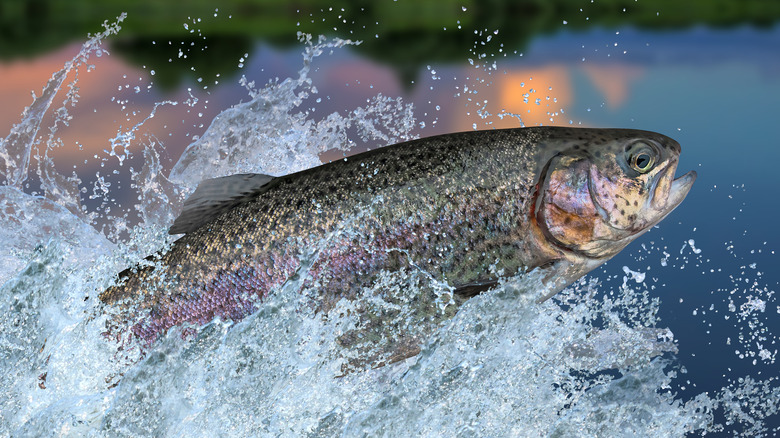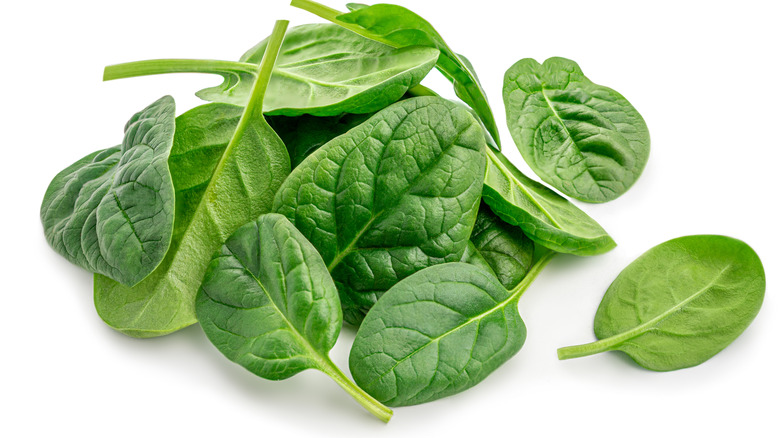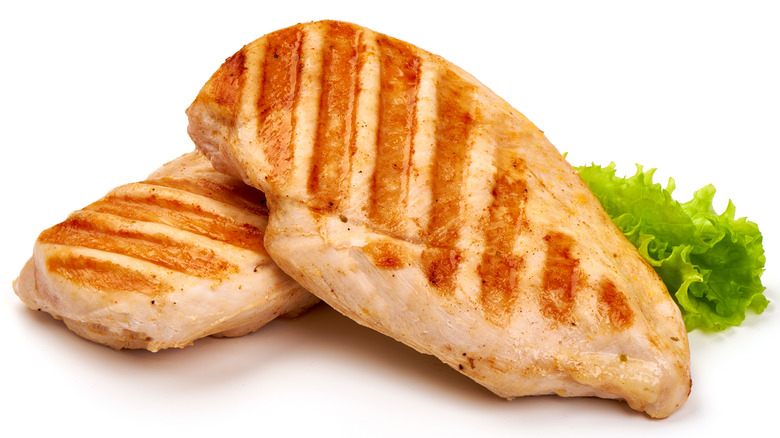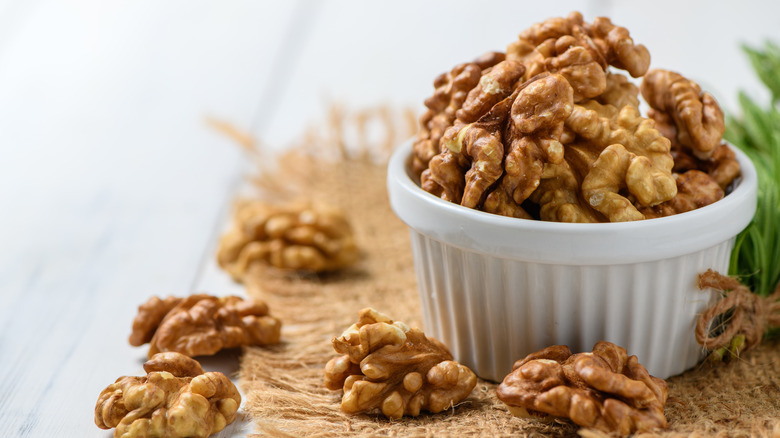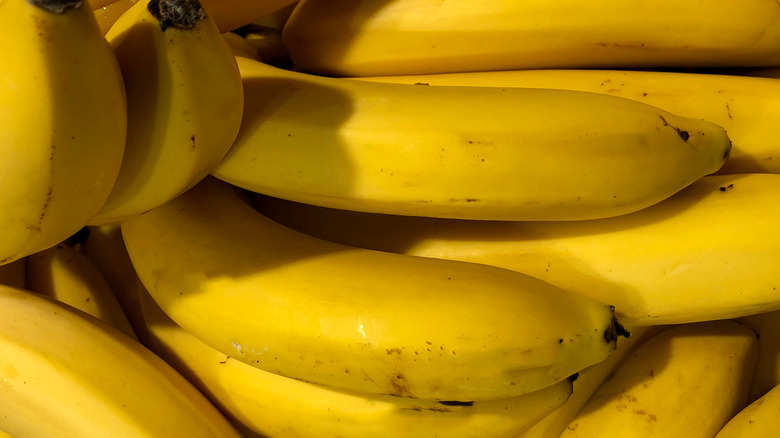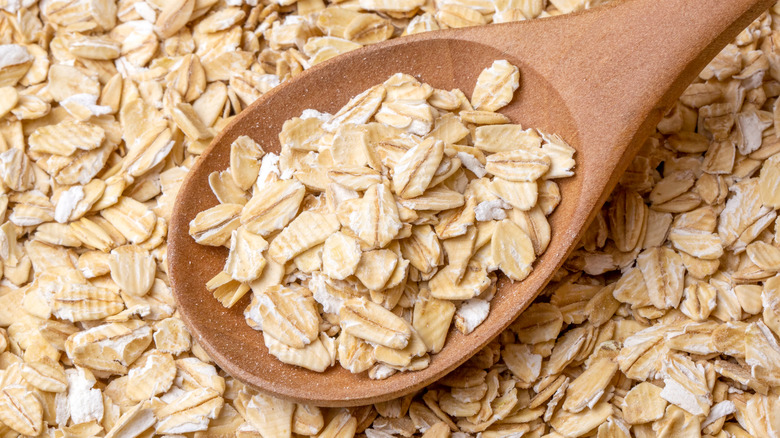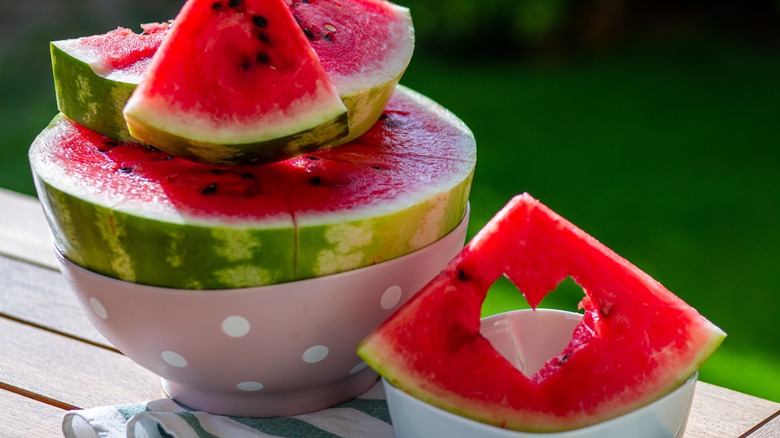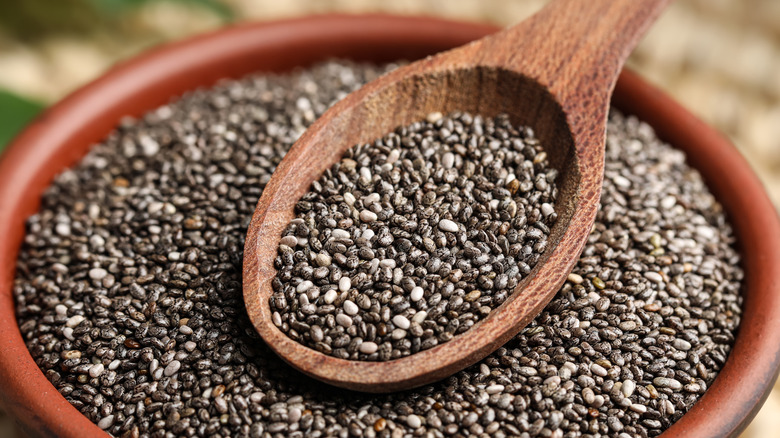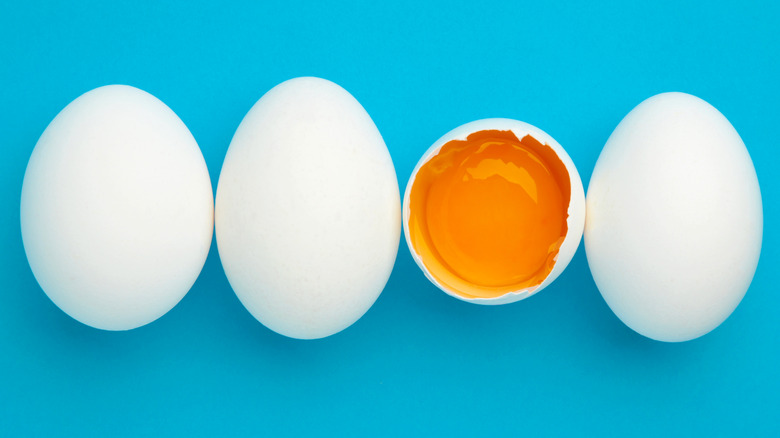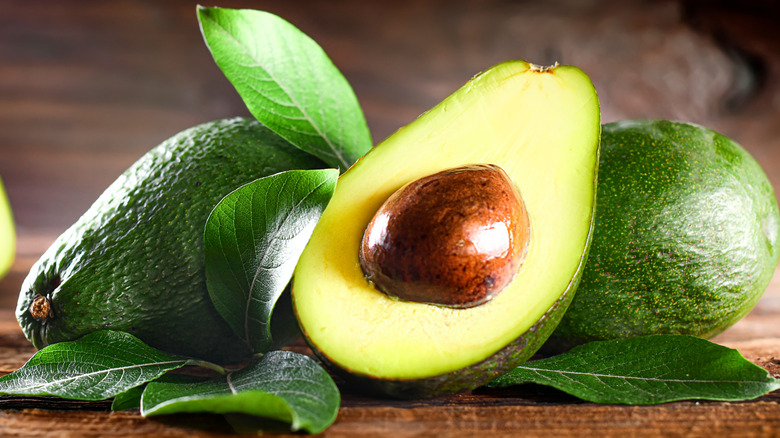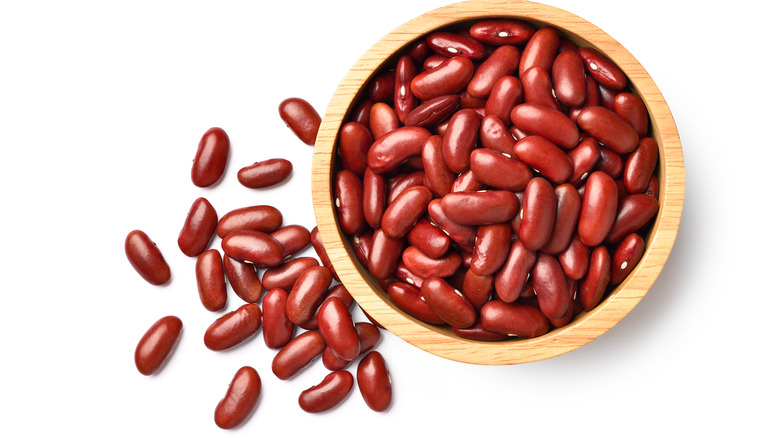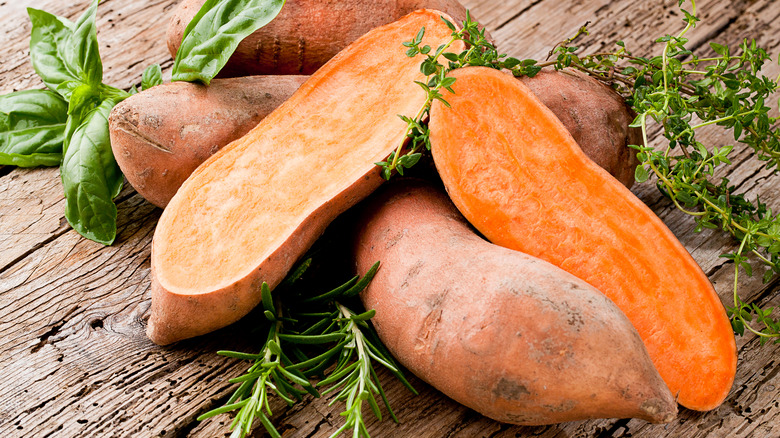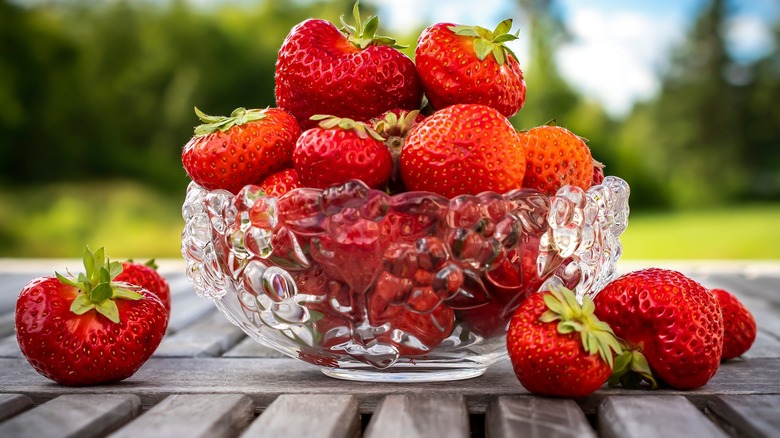14 Foods That Help You Fight Fatigue
Sometimes, we use words interchangeably, even when they don't mean the exact same thing. Take being tired versus being fatigued, for instance. While both states might seem very similar on the surface, they're actually different.
As the Mayo Clinic explains, when a person is tired from, say, overworking, then a little rest will probably have them feeling much better. But when a person is fatigued, then a good night's sleep isn't going to fix the problem. In fact, being fatigued can affect someone not just physically, but also emotionally and psychologically. What's more, the culprit behind fatigue can be a wide variety of health issues, including anemia, heart disease, an overactive or an underactive thyroid, and obesity (via Mayo Clinic). There's even a condition known as chronic fatigue syndrome (which is why you should consider speaking with a medical professional when you feel fatigued).
While health concerns can cause fatigue, diet can also play a role. According to the Mayo Clinic, "unhealthy eating habits" could be behind (or at, be least contributing to) feeling fatigued. This means not just avoiding certain foods, but also getting the right amounts of foods that might help, depending on the underlying cause of your fatigue. In this article, we will be exploring some of these potentially fatigue-fighting foods, as well as some of their pros and cons.
Fish
Let's face it: Not everyone is a fan of fish. Some might even categorize it as an acquired taste. But if you have chronic fatigue syndrome, you might want to consider adding more fish to your diet (via Mount Sinai). With that said, there are some things to keep in mind.
Have you ever had the flu and still didn't feel well even after you were technically over it? If so, then you might have experienced chronic fatigue syndrome. This health condition sometimes occurs after someone has the flu and can come with a number of symptoms, including (as its name would suggest) high levels of fatigue, headaches, and difficulty concentrating. But research is finding that omega-3 fatty acids (which is found in fish) might help. In fact, Mount Sinai recommends adding more cold-water fish to your diet if you have chronic fatigue syndrome. These can include certain species of salmon and trout (per New Mexico Department of Game & Fish).
Although the omega-3 fatty acids in fish might have different health properties, the California Office of Health Hazard Assessment warns that a fish's environment (in particular the water it swims in) can lead to the fish absorbing unsafe chemicals, which can be passed along to the humans who eat it. Also, there's concerns about omega-3s interacting with blood thinners (via Mount Sinai).
Spinach
There are certain foods that often make "healthy options" lists. Take spinach, for example. You've probably heard about its vitamins and other good-for-you components since you were a child. However, eating spinach isn't necessarily for everyone.
According to the Mayo Clinic, a health issue that can cause fatigue is iron deficiency anemia. When a person doesn't have enough iron, that can impact their red blood cells' ability to transport oxygen — and ultimately, their energy levels. While spinach might not exactly be a cure-all for this health issue, its iron content can be beneficial for someone with this type of anemia (via Consumer Reports). In fact, you might want to eat more baby spinach, since 100 grams of it contain 1.26 milligrams of iron, per the U.S. Department of Agriculture (USDA). That same amount of mature spinach has slightly less (1.05 milligrams), via the USDA.
While spinach might help with iron deficiency anemia-related fatigue, it also contains large amounts of vitamin K, a nutrient that can interfere with the blood thinner warfarin (per Mayo Clinic). If you're on warfarin or a blood thinner, consult your doctor before adding more spinach (or other vitamin K-rich foods) to your diet.
Water
It's easy to forget to drink enough water. After all, there are so many other more flavorful and less healthy beverages available in vending machines and convenience stores. But if you're fatigued, then you might want to start prioritizing drinking the right amount of water.
As the Dallas Wellness Center explains, a person with chronic fatigue syndrome might experience dehydration. Think of it this way: A well-oiled machine will run more smoothly and probably last longer than a machine without the right amount of oil. Similarly, your body relies on the right balance of fluids to function properly, and when that balance is off, it can put a strain on you and lead to fatigue. Additionally, dehydrated chronic fatigue syndrome patients might also experience other health issues like brain fog and headaches.
However, if you think rapidly chugging water will instantly solve your fatigue, think again. While water can help with dehydration, it's advised to gradually increase your water intake over the course of a few weeks. Plus, if you have other conditions like kidney issues, that could affect how much water you should add. You might want to keep a journal and track how much water you're currently drinking.
Chicken
How many times have you heard "it tastes just like chicken"? Granted, if you like chicken, then it might be encouraging to think of a food you've never tried before tasting (or hopefully tasting) like something you enjoy. But even if you're not a big fan of chicken, there's research that it might help with fatigue.
A study involving 20 males tested whether or not essence of chicken had an impact on fatigue (via Medical Science Monitor). Over a four-week period, the individuals were asked to do a task that would cause mental fatigue. They were also given drinks that either contained chicken essence or were a placebo. The study concluded that "daily intake of essence of chicken could be effective for the recovery from mental fatigue and is a promising candidate for use as an anti-fatigue food." The researchers also noted that certain antioxidants found in chicken essence (carnosine and anserine) could be why chicken essence might help with mental fatigue.
Besides its potential as a way to help with mental fatigue, chicken is also a good source of protein, which can help with weight management (via WebMD). Per the Mayo Clinic, obesity is a possible cause of fatigue. Also, chicken contains nutrients like vitamin B12, copper, iron, and zinc. Just keep in mind that the U.S. Department of Agriculture (USDA) advises portion controlling how much chicken you eat daily. This should also take into consideration how physically active you are.
Nuts
Changing one's diet alone isn't always enough to address a person's health concerns. However, dietary changes under a doctor's supervision can be part of the treatment plan for various health issues. One example is myositis, which as the Hospital for Special Surgery (HSS) explains can cause fatigue.
Technically, myositis can refer to more than one condition that can affect a person's muscles. A patient with myositis has white blood cells (lymphocytes) that cause inflammation in one's muscles, per HSS. This can lead to not just fatigue, but also muscle pain and weakness. While there is no one-size-fits-all meal plan for myositis, HSS does recommend eating a balanced diet. This can include nuts, because they contain protein and fiber. In fact, according to the U.S. Department of Agriculture, 100 grams of raw halves of English walnuts contain 14.6 grams of protein and 5.2 grams of fiber.
Besides being a good source of protein, walnuts are also loaded with calcium (88 milligrams), magnesium (142 milligrams), and phosphorus (365 milligrams), per 100 grams. They are also an excellent source of potassium (424 milligrams per 100 grams), but as Harvard notes, high amounts of potassium in one's diet can cause fatigue in someone with kidneys that aren't working properly.
Bananas
Bananas are an exceptionally popular fruit. They're perfect for breakfast, in smoothies or with cereal. A nice warm slice of banana bread can be a pleasant treat on a cold day. And more good news: They can be a good addition to a fatigue fighting diet.
As Medical News Today explains, bananas have both carbohydrates and fiber. Because of this, they can give a person energy that lasts for a longer amount of time than other foods that don't have this fiber/carbs combo. Additionally, nutritional psychiatrist Dr. Uma Naidoo wrote for CNBC that bananas might help fight fatigue because they have prebiotics. In fact, according to Adventist Health, eating bananas with yogurt can be beneficial since the prebiotics in the bananas support the probiotics in the yogurt. (Prebiotics are food for the good bacteria in your gut, and probiotics are live yeast and good bacteria, per WebMD.)
Although there are positives regarding bananas and fatigue, bananas are also rich in potassium — and too much or too little potassium in one's body can both cause fatigue (per Harvard). If your kidneys aren't functioning properly and you're taking in large amounts of potassium, that can cause hyperkalemia and fatigue.
Oats
Next time you go grocery shopping, take a moment to look around at how many products contain oats. Indeed, it's very easy to find oats in various breakfast foods — and that can be good news for someone experiencing fatigue.
According to nutritional psychiatrist Dr. Uma Naidoo, oats check a couple of boxes when it comes to possibly fighting off fatigue (via CNBC). For one, they have prebiotics, which can support good gut health. Also, steel-cut oatmeal has low-GI carbohydrates. This means that it's a low glycemic index food, and (as Harvard explains) this can make a difference when it comes to blood sugar levels and energy. High-glycemic foods might cause a blood sugar spike and give you more energy temporarily, but when your blood sugar drops, it can leave you feeling exhausted. Low-glycemic foods, on the other hand, are digested more slowly, keeping your blood sugar levels steadier. And although oats can be a low-glycemic food, instant oatmeal that contains refined starches, which are high-GI foods.
Besides some oatmeal products being low-glycemic foods, oats are a good source of iron, which can help one avoid developing iron deficiency anemia (which can cause fatigue, per GoodRx).
Watermelon
It's not exactly a shock that watermelons have a large amount of water. After all, the word "water" is in their name. But that very quality is why they might be a good choice for someone with fatigue (via Medical News Today).
According to WebMD, more than 90% of a watermelon is water. And since dehydration can lead to sluggishness, eating foods rich in water can help with your energy levels. Also, the Dallas Wellness Center explains that chronic fatigue syndrome and dehydration can go hand in hand. But that's not all. Sometimes, chronic fatigue syndrome patients who are dehydrated experience cravings for things like sugar when they really need fluids. This means they might reach for a sweet food instead of a glass of water. Watermelon provides that sweet taste (and even some carbs) along with a healthy amount of water.
Besides its water content, watermelon has other healthy qualities. For instance, it contains an antioxidant called lycopene, which might help lower your chances of developing diabetes and cancer, per WebMD.
Chia seeds
According to the University of Michigan, fatigue is a common health issue reported by breast cancer survivors. The school created a fatigue reduction diet specially recommended for survivors of this form of cancer, which includes chia seeds due to their omega-3 content. (Note: Speak with your health care professional before adding any foods recommended in this diet to your meal plan, whether or not you are a breast cancer survivor.)
As WebMD points out, chia seeds contain iron. Per GoodRx, taking in the right amount of iron can help lower the chances of developing iron deficiency anemia, which can cause fatigue. Furthermore, chia seeds are great sources of fiber, so adding them to your diet could help keep your blood sugar levels steady (per WebMD).
Be careful, though: Consuming too many of these high-fiber seeds can cause digestive issues like gas, bloating, constipation, and diarrhea. Also, you should talk with your health care professional about eating chia seeds if you have an inflammatory bowel condition, or if you are taking medication to help manage your blood pressure or blood sugar.
Eggs
"By some estimates, as many as 50 percent of older adults suffer from some sort of mild fatigue." This statement to Consumer Reports by Dr. Joan Eckerson, professor and chair of the department of exercise science and prehealth professions at Creighton University in Omaha, Nebraska, demonstrates how widespread fatigue is. But that doesn't mean that an elderly person experiencing fatigue cannot improve their energy levels.
Dr. Wayne Campbell, a professor in the department of nutrition science at Purdue University in West Lafayette, Indiana, told Consumer Reports that high-quality foods packed with protein can help with fatigue. And if you guessed that eggs made the list as both protein-rich and high-quality, you'd be absolutely correct. As a matter of fact, an egg can contain 6 grams of protein. Additionally, eggs have iron, which can help with anemia brought on by low iron levels in the body. Eating eggs isn't going to instantly fix the fatigue often brought on by this form of anemia. But having a medical professional check your iron levels and incorporating the right amount of iron into your diet can help lower your chances of developing iron deficiency anemia and the fatigue that can come with it.
Also, according to Breastcancer.org, fatigue and cancer treatments can go hand in hand. The protein in eggs can also help cancer patients with fatigue. In fact, the site recommends keeping hard-boiled eggs in the fridge as a fatigue-fighting snack.
Avocados
Whether on toast or in guacamole, avocadoes are a very popular food. If you've been on the fence about trying them, you might want to go ahead and put them on your shopping list — especially if you have a certain fatigue-causing health issue.
As the Hospital for Special Surgery (HSS) explains, a patient with myositis can experience fatigue. However, adjustments to one's diet (under a medical professional's supervision) might help with this condition. HSS recommends incorporating more monounsaturated fats and foods that have omega-3s into your meal plan. Avocados happen to fall under both categories. However, if eating guacamole every day is not appealing, there are other ways to work avocados into your daily life. For example, if you normally like mayo on your chicken sandwich, you might want to try swapping it out for avocado.
In addition, avocados are a good source of different B vitamins, which can help your body create energy from the food you eat (via WebMD). Take note, though, that avocados are also loaded with potassium — a nutrient that, in large quantities, can cause hyperkalemia in people with kidneys that aren't functioning properly (per Harvard).
Beans
For some, what automatically comes to mind when they hear "beans" and "energy" are coffee beans. But as Menopause Now points out, the caffeine jolt from products like coffee is only temporary, and can eventually lead to feeling more tired. However, adding beans like kidney beans to your diet could be a good recipe for improving your energy levels.
Beans in general have several nutritious components that make them potentially good for fatigue. For one, they are packed with fiber, which can not only help keep blood sugar from spiking and crashing, but also aid in digestion. Beans also contain protein that's easier to digest, which takes some strain off one's body. Additionally, they have magnesium, a mineral that can help with muscle fatigue by supporting good circulation. And let's not forget the iron content of beans, which can help with both energy production and distribution.
So, which beans might be best for fight your fatigue? Well, it's hard to go wrong when choosing a variety of beans. With that said, some beans might have more of what you need than others. For instance, if you need more iron in your fatigue-fighting diet, then you might want to opt for kidney beans. Or you might try a combination of these and other beans, each with their own health benefits.
Sweet potatoes
For some, sweet potatoes are a nice side dish for a meal. For others, they might be, well, a bit too sweet for their liking. But if you fall under the second group and suffer from fatigue, you might want to give sweet potatoes another try.
According to CBS News, Stanford University tested if sweet potatoes can help with fatigue in women. Their findings showed that eating one cup of sweet potatoes daily improved fatigue in 78% of the study participants. Additionally, Healthline notes that sweet potatoes are a source of vitamin B6 (which can help your body turn the food you eat into energy) and both soluble and insoluble fiber (which are beneficial for digestion and blood sugar levels).
With that said, according to the Asia Pacific Journal of Clinical Nutrition, sweet potatoes contain a large amount of oxalates, which are said to be associated with the development of kidney stones. If kidney stones are a concern for you, speak with a medical professional before adding sweet potatoes to your diet.
Strawberries
If you have a sweet tooth, strawberries can be a healthy way to satisfy it. Whether you enjoy them on their own or as part of a more intricate dessert, they're both tasty and nutritious. Plus, they also can help with fatigue.
Per the University of Michigan, it's common for breast cancer survivors to experience fatigue. So, they developed a fatigue reduction diet to research how foods might benefit these patients' energy levels. One of their recommendations was eating foods high in vitamin C, like strawberries. Furthermore, according to registered dietitian Danna Raphael, iron deficiency can be the culprit behind both physical and mental fatigue (per Hospital for Special Surgery). Vitamin C can help the body absorb iron, meaning strawberries can be a good addition for an iron deficiency diet. Additionally, more than 90% of a strawberry is water, meaning it can help with fatigue caused by dehydration.
Although strawberries might help with fatigue, it is possible to be allergic to them (via Healthline). Typical symptoms of a strawberry allergy can include different parts of the body swelling up, per the International Archives of Allergy and Immunology. A person might also develop hives, breathing problems, tingling or itching in their mouth, and headaches. In addition, the International Journal of Cancer cautions that a patient with thyroid problems might want to avoid strawberries.


